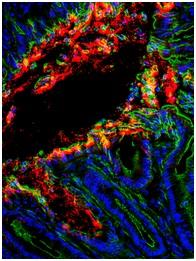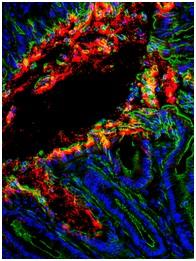
Credit: Image courtesy of the Turner laboratory at Brigham and Women's Hospital.
Researchers want to know: does diarrhea serve a purpose? Does it actually help clear the bacteria causing a gastrointestinal infection, or is it merely a symptom of disease that should be prevented as much as possible? In a new study from Brigham and Women's Hospital, investigators explore the immune mechanism that drives diarrhea, concluding that it does play a critical role in pathogen clearance in the early stages of infection. The new study, published today in Cell Host and Microbe, also uncovers a previously unrecognized role for interleukin-22, an immune system molecule, in the host's defense against infection.
"The hypothesis that diarrhea clears intestinal pathogens has been debated for centuries," said corresponding author Jerrold Turner, MD, PhD, of the BWH Departments of Pathology and Medicine. "Its impact on the progression of intestinal infections remains poorly understood. We sought to define the role of diarrhea and to see if preventing it might actually delay pathogen clearance and prolong disease."
To investigate, researchers used a mouse model infected with Citrobacter rodentium, the mouse equivalent of an E. coli infection. Using this model, they saw an increase in the permeability of the intestinal barrier within just two days of infection — well before inflammation and epithelial damage. In particular, they uncovered a critical role for interleukin-22 that in turn influences another molecule called claudin-2, previously known to be involved in causing diarrhea. They found that diarrhea resulting from the signaling of these two molecules helped promote pathogen clearance and limited disease severity.
Other investigators have proposed developing new therapeutics to inhibit claudin-2. However, Turner and colleagues explain that the activation of this pathway may be critical for combating an infection, particularly in the early stages of a disease. They conclude that diarrhea is critical to enteric pathogen clearance, and that IL-22 may play a key role in host defense.
###
This work was supported by National Institute of Health grants F30DK103511, T32HD007009, R01DK61931, R01DK68271, and R24DK099803; Crohn's and Colitis Foundation of America; the State Scholarship Fund of China 201208110294; and Core Research for Evolutional Science and Technology of the Japan Science and Technology Agency.
Paper cited: Tsai PY et al. "IL-22 upregulates epithelial claudin-2 to drive diarrhea and enteric pathogen clearance." Cell Host & Microbe DOI: 10.1016/j.chom.2017.05.009
Media Contact
Haley Bridger
[email protected]
617-525-6383
@BrighamWomens
http://www.brighamandwomens.org
Related Journal Article
http://dx.doi.org/10.1016/j.chom.2017.05.009
############
Story Source: Materials provided by Scienmag





